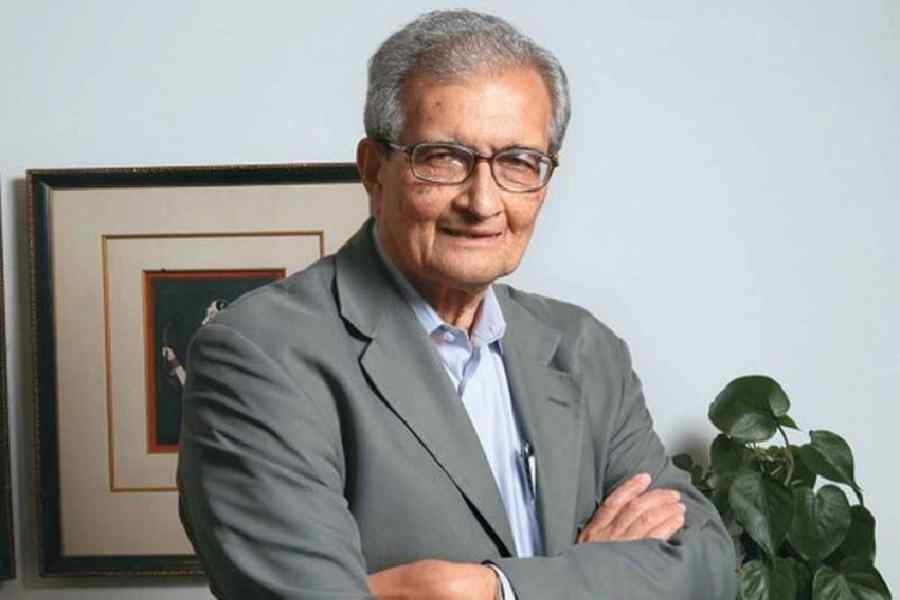There are greater goals in life than winning the Nobel Prize. At least, there ought to be.
Or so, feels Nobel laureate thinker-philosopher-welfare economist Professor Amartya Sen who dubbed the award as a "nice thing to have", but opined that his life wouldn't have been wasted even without it.
Sen said that the money he received from the prize helped him start Pratichi Trust, a research-based charity focussing on education and healthcare of children.
"Nobel is an award I received but I don't think my life would have been wasted even if I didn't get it. It was nice to have received it. I got some money and could start a charity called Pratichi Trust involving education and healthcare elements of children," Sen said while speaking to PTI in an exclusive interview at his ancestral abode in Bolpur in Birbhum district of West Bengal.
"There’s also a little bit of luck involved in whether or not you end up getting one of these prizes... I do not think I had a goal to get the Nobel or any other prize for that matter," Sen reminisced.
Sen received the Sveriges Riksbank Prize in Economic Sciences in Memory of Alfred Nobel in 1998 for his contributions to welfare economics and social choice theory alongside his interest in the problems faced by the poor.
"When the Nobel award came my way, it also allowed me to do something immediate and practical about my old obsessions, including literacy, basic health care and gender equity, aimed specifically at India and Bangladesh. The Pratichi Trust, which I have set up with the help of some of the prize money, is, of course, a small effort compared with the magnitude of these problems. But it is nice to re-experience something of the old excitement of running evening schools, more than fifty years ago, in villages near Shantiniketan," Sen states on the website of Pratichi.
Recollecting his childhood, the Bharat Ratna talked of his memories of moving from Dhaka to Bolpur at the age of seven and studying at the Patha Bhavana, the institution of primary and secondary education in Shantiniketan founded by Rabindranath Tagore, while staying with his grandparents.
"I was born in Shantiniketan but was not here immediately, because we were staying in Dhaka. That's the city I come from. I moved back to Shantiniketan at the age of seven and enrolled as a student here, staying with my grandparents. My father, Ashutosh Sen, was a professor of Chemistry at Dhaka University. I used to go there during my holidays," the nonagenarian academic recounted.
The economist said that his growing up in Bolpur, his association with the Patha Bhavana and the influence of his parents in his early life have made way for his volume of work and the books he has penned.
"There must be. But I suppose it would be easier for somebody else to connect the dots than for me to diagnose. I think some of the ideas that got attached to (my works) came from my childhood," he said.
On whether at any point of time in his childhood he dreamt of becoming a poet like Tagore given his early attachment to Gurudev, Sen hinted that though he never wanted to write poetry, he felt that Tagore's influence on him was both profound and personal.
"I couldn't have been a poet like Rabindranath because I do not like poetry. Anyway, I think my family was quite close to the Thakur poribar (family) and my mother was very close to Tagore and his painter-nephew Abanindranath.
"Rabindranath gave me my name. Immediately after my birth, he sent a letter to my mother saying that 'you should find a name which is new’. And he proposed 'Amartya', and that seemed to have been decisive," he said.
Asked who among his parents – mother Amita or father Ashutosh – he was closer to, Sen said that both had a lasting influence on his life.
"That's a tough competition. I think I was close to both of them. My mother was a writer, an editor and a dancer in traditional Indian schooling, Bharatnatyam, Manipuri. Tagore was very keen on dance dramas and she took a leading part in some of them. My mother was also interested in learning from abroad in Shantiniketan school and became a judo expert. It was interesting that there was women's liberation within the family.
"My father was a very successful teacher of Chemistry and he tried to rise above the Hindu-Muslim division that was going on at that time. He had a very clear notion that he wanted a united India. So, I have learned a lot from both of them. I've been interested in politics since my childhood. And I got input from both sides of my family," he said.
Asked about his future plans, Prof Sen said, "I can tell you that winning a race in running is not part of my plan. I like reading and writing. I enjoyed poetry a lot when I was young although I never wrote any. I'm glad that I didn't. I don't know what it would have been.
"I don't know how many years more I have left. Whatever time I have, I think I could enjoy myself by reading again and again to find out what's happening in the world. And at the same time, (I will) try to contribute by expressing my thoughts about them. I have never been shy of expressing my views even when they were quite different from that of others," the Nobel laureate concluded.
Except for the headline, this story has not been edited by The Telegraph Online staff and has been published from a syndicated feed.











